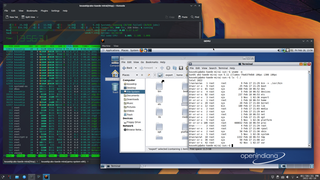
An operating system (OS) is system software that manages computer hardware and software resources, and provides common services for computer programs.

Mac OS X Server, is a discontinued series of Unix-like server operating systems developed by Apple Inc. based on macOS. It provided server functionality and system administration tools, and provided tools to manage both macOS-based computers and iOS-based devices.
In computing, cross-platform software is computer software that is designed to work in several computing platforms. Some cross-platform software requires a separate build for each platform, but some can be directly run on any platform without special preparation, being written in an interpreted language or compiled to portable bytecode for which the interpreters or run-time packages are common or standard components of all supported platforms.

Bonjour is Apple's implementation of zero-configuration networking (zeroconf), a group of technologies that includes service discovery, address assignment, and hostname resolution. Bonjour locates devices such as printers, other computers, and the services that those devices offer on a local network using multicast Domain Name System (mDNS) service records.
Zero-configuration networking (zeroconf) is a set of technologies that automatically creates a usable computer network based on the Internet Protocol Suite (TCP/IP) when computers or network peripherals are interconnected. It does not require manual operator intervention or special configuration servers. Without zeroconf, a network administrator must set up network services, such as Dynamic Host Configuration Protocol (DHCP) and Domain Name System (DNS), or configure each computer's network settings manually.

ipconfig is a console application program of some computer operating systems that displays all current TCP/IP network configuration values and refreshes Dynamic Host Configuration Protocol (DHCP) and Domain Name System (DNS) settings.

UEFI is a set of specifications written by the UEFI Forum. They define the architecture of the platform firmware used for booting and its interface for interaction with the operating system. Examples of firmware that implement these specifications are AMI Aptio, Phoenix SecureCore Tiano, TianoCore EDK II and InsydeH2O.

ifconfig is a system administration utility in Unix-like operating systems for network interface configuration.
NX technology, commonly known as NX or NoMachine, is a proprietary cross-platform software application for remote access, desktop sharing, virtual desktop and file transfer between computers. It is developed by the Luxembourg-based company NoMachine.

QEMU is a free and open-source emulator. It emulates the machine's processor through dynamic binary translation and provides a set of different hardware and device models for the machine, enabling it to run a variety of guest operating systems. It can interoperate with Kernel-based Virtual Machine (KVM) to run virtual machines at near-native speed. QEMU can also do emulation for user-level processes, allowing applications compiled for one architecture to run on another.

Ettercap is a free and open source network security tool for man-in-the-middle attacks on a LAN. It can be used for computer network protocol analysis and security auditing. It runs on various Unix-like operating systems including Linux, Mac OS X, BSD and Solaris, and on Microsoft Windows. It is capable of intercepting traffic on a network segment, capturing passwords, and conducting active eavesdropping against a number of common protocols. Its original developers later founded Hacking Team.
strongSwan is a multiplatform IPsec implementation. The focus of the project is on authentication mechanisms using X.509 public key certificates and optional storage of private keys and certificates on smartcards through a PKCS#11 interface and on TPM 2.0.
This article presents a comparison of the features, platform support, and packaging of many independent implementations of Domain Name System (DNS) name server software.
The domain name .local is a special-use domain name reserved by the Internet Engineering Task Force (IETF) so that it may not be installed as a top-level domain in the Domain Name System (DNS) of the Internet. As such it is similar to the other special domain names, such as .localhost. However, .local has since been designated for use in link-local networking, in applications of multicast DNS (mDNS) and zero-configuration networking (zeroconf) so that DNS service may be established without local installations of conventional DNS infrastructure on local area networks.
The following is a timeline of virtualization development. In computing, virtualization is the use of a computer to simulate another computer. Through virtualization, a host simulates a guest by exposing virtual hardware devices, which may be done through software or by allowing access to a physical device connected to the machine.

FreeBSD is a free and open-source Unix-like operating system descended from the Berkeley Software Distribution (BSD), which was based on Research Unix. The first version of FreeBSD was released in 1993. In 2005, FreeBSD was the most popular open-source BSD operating system, accounting for more than three-quarters of all installed and permissively licensed BSD systems.
Binary-code compatibility is a property of a computer system, meaning that it can run the same executable code, typically machine code for a general-purpose computer CPU, that another computer system can run. Source-code compatibility, on the other hand, means that recompilation or interpretation is necessary before the program can be run on the compatible system.

Windows Server 2016 is the eighth release of the Windows Server server operating system developed by Microsoft as part of the Windows NT family of operating systems. It was developed alongside Windows 10 and is the successor to the Windows 8.1-based Windows Server 2012 R2. The first early preview version became available on October 1, 2014 together with the first technical preview of System Center. Windows Server 2016 was released on September 26, 2016 at Microsoft's Ignite conference and broadly released for retail sale on October 12, 2016. It was succeeded by Windows Server 2019 and the Windows Server Semi-Annual Channel.

Endian Firewall is an open-source router, firewall and gateway security Linux distribution developed by the South Tyrolean company Endian. The product is available as either free software, commercial software with guaranteed support services, or as a hardware appliance.











